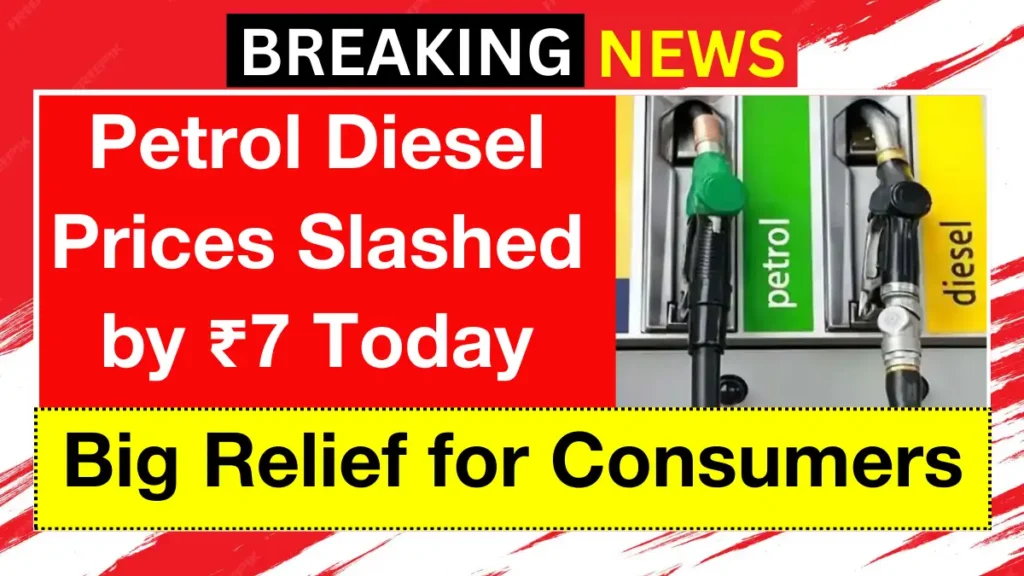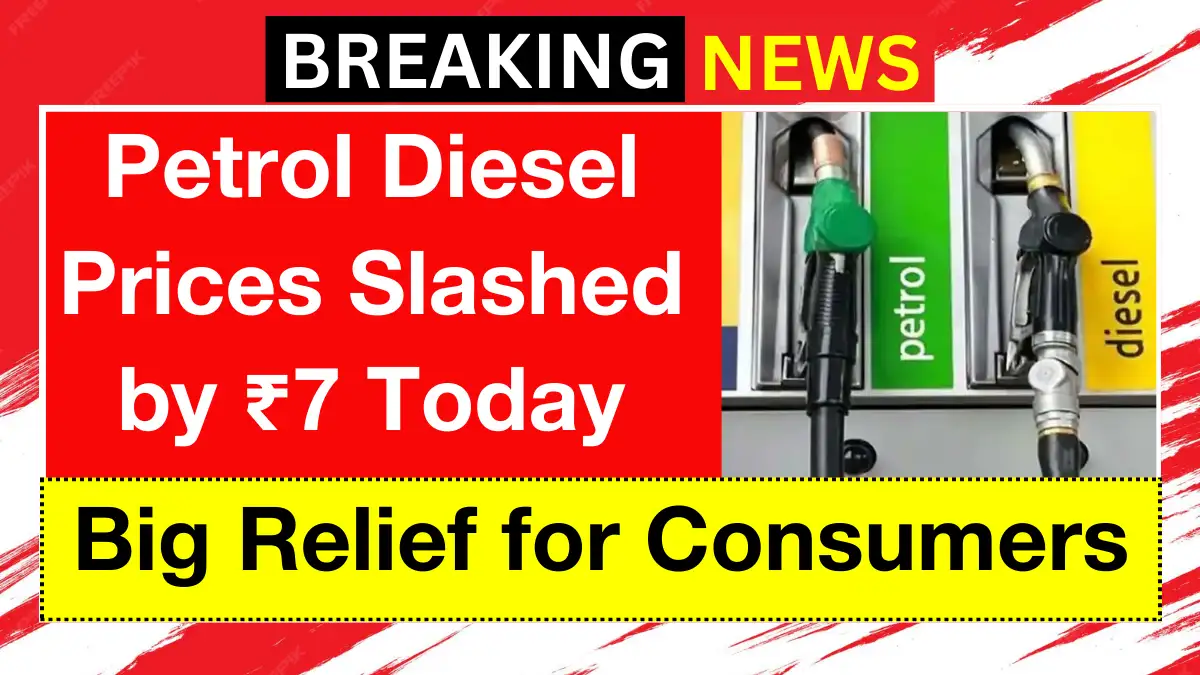Petrol & Diesel Prices Drop by ₹7 Today: In an unexpected turn of events, fuel prices have dropped by ₹7 today, offering a much-needed relief to consumers across the country. This drop in petrol and diesel prices has been welcomed by many, particularly in a time when fuel costs had been steadily rising.
The price reduction could potentially have a significant impact on daily commuters, transport businesses, and the overall economy.

Reasons Behind the Price Reduction
The recent reduction in petrol and diesel prices can be attributed to several factors, including fluctuations in global crude oil prices and government intervention. The international oil market is highly volatile, with prices often shifting based on geopolitical events, supply and demand, and economic trends. In recent weeks, global crude oil prices have softened slightly, providing some breathing room for domestic fuel prices to be adjusted downward.
In addition, the Indian government has been known to make adjustments to excise duties and taxes on fuel in order to mitigate the impact of price hikes on consumers. The combination of both market conditions and government actions has resulted in this notable drop in fuel prices today.
Impact on Commuters and Daily Life
For commuters who rely on petrol and diesel for their vehicles, this price reduction brings significant relief. With the cost of fuel being one of the largest expenses for many people, a ₹7 decrease in the price per litre can make a noticeable difference over time. Whether it’s a daily commute to work or long-distance travel, this change could result in savings for drivers and passengers alike.
Public transport services that depend on diesel also stand to benefit from this price drop. Buses, taxis, and other forms of shared transportation could see a reduction in operating costs, potentially leading to lower fares for passengers. This could be especially beneficial for those in urban areas who use public transport as their primary mode of travel.
Effect on the Economy and Industries
Fuel prices play a crucial role in the broader economy. When the cost of petrol and diesel drops, it can have a positive ripple effect across various sectors. For industries that rely on transportation, such as logistics and manufacturing, a reduction in fuel prices means lower transportation costs. This can result in cheaper goods and services, benefiting consumers and boosting economic growth.
In addition, sectors like agriculture and construction, which depend heavily on diesel-powered machinery, could experience reduced operational expenses. For farmers, the lower cost of diesel could translate into savings for irrigation, transportation, and other agricultural activities, helping to ease some of the financial pressures they face.
Environmental Considerations and Fuel Usage
While the drop in petrol and diesel prices is undoubtedly good news for consumers, it’s essential to consider the environmental impact of continued reliance on fossil fuels. The transportation sector is a significant contributor to air pollution and carbon emissions, and a reduction in fuel prices could encourage higher fuel consumption. This could lead to increased emissions and further strain on the environment.
In response to these concerns, many experts are advocating for greater investment in renewable energy sources, such as electric vehicles (EVs) and alternative fuels. The government has already introduced policies to promote EV adoption, and the hope is that the continued growth of the electric vehicle market will reduce the nation’s dependence on petrol and diesel in the long run.
The Future of Fuel Prices
The drop in fuel prices today may be a temporary respite, as fuel prices are influenced by a multitude of global and domestic factors. The trajectory of oil prices in international markets will continue to play a pivotal role in determining the price of petrol and diesel in the coming weeks and months. If global crude oil prices rise again, consumers may face further price hikes, which could put a strain on household budgets.
However, there is hope that this price reduction signals a trend toward stabilizing fuel costs, making them more predictable for consumers and businesses alike. As India continues to navigate the challenges of an evolving energy landscape, it is likely that fuel prices will continue to be influenced by a mix of market dynamics and government policies aimed at balancing economic growth with environmental sustainability.
Conclusion
Today’s drop in petrol and diesel prices by ₹7 is a welcome change for consumers who have been grappling with rising fuel costs in recent months. While this reduction brings immediate financial relief, it also highlights the ongoing challenges of managing fuel prices in a globalized economy. The impact of this price drop will be felt by commuters, businesses, and industries alike, with the hope that the trend may continue in the coming weeks.
However, as the world moves toward a more sustainable future, it is important to remain mindful of the long-term environmental implications of fossil fuel use. The shift towards cleaner energy sources and the promotion of electric vehicles will be crucial in ensuring that future generations are not burdened with the environmental consequences of over-reliance on fossil fuels.
Ultimately, while today’s fuel price drop offers a moment of respite, it serves as a reminder of the complex and interconnected forces that shape the cost of living and the need for continued investment in green technologies for a sustainable future.
Disclaimer
The information provided in this article is based on current market trends and general industry observations. Fuel prices are subject to change based on global oil markets, government policies, and other economic factors. While every effort has been made to ensure accuracy, the rates and details mentioned may not reflect the most up-to-date figures at the time of reading. Readers are encouraged to verify the latest fuel prices from official sources or local distributors before making any decisions based on the information provided. The content is for informational purposes only and should not be considered as financial or investment advice.
